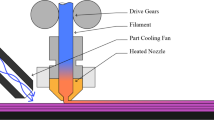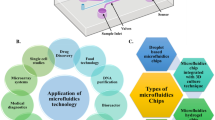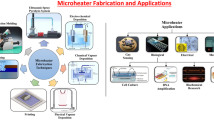Abstract
The use of microfluidics has benefitted numerous scientific disciplines towards further advancements in sectors such as plant and pollution monitoring, diagnostic systems, detection of pathogenic microorganisms, and detection of harmful substances. Advancements in scientific disciplines are achieved when researchers have access to required materials and equipment. This is true of microfluidic technologies. However, an on-going challenge to widespread access to microfluidic technologies is the expense and complexity of microfluidic fabrication systems. In the last decade, numerous efforts have been realized for the development of microfluidic fabrication methods that do not require a cleanroom facility and other expensive equipment. These fabrication methods typically have varying parameters and restrictions that inhibit the speed of fabrication and customization of microfluidic chip features. The following work explores a straightforward method for rapid fabrication of microfluidic chip systems using a combination of stressed polystyrene sheets and computerized micromilling. A quantitative analysis of the anisotropic shrinking properties of the stressed polystyrene sheet is completed with experimentation on various geometric features. These experiments will aid in future use of this technology. The proposed fabrication method can inexpensively fabricate a flow-based microfluidic gradient mixer in under an hour with inexpensive fabrication equipment.







Similar content being viewed by others
Data availability
Not applicable.
Code availability
Not applicable.
References
Arata H, Komatsu H, Hosokawa K, Maeda M, Chin W (2012) Rapid and sensitive microRNA detection with laminar flow-assisted dendritic amplification on power-free microfluidic chip. PLoS ONE 7:1–5. https://doi.org/10.1371/journal.pone.0048329
Bernabini C, Holmes D, Morgan H (2011) Micro-impedance cytometry for detection and analysis of micron-sized particles and bacteria. Lab Chip 11:407–412. https://doi.org/10.1039/C0LC00099J
Bosma R, Devasagayam J, Singh A, Collier CM (2020) Microchip capillary electrophoresis dairy device using fluorescence spectroscopy for detection of ciprofloxacin in milk samples. Sci Rep 10:13548. https://doi.org/10.1038/s41598-020-70566-1
Chen G, Lin Y, Wang J (2006) Monitoring environmental pollutants by microchip capillary electrophoresis with electrochemical detection. Talanta 68:497–503. https://doi.org/10.1016/j.talanta.2005.07.004
Chen C, Breslauer DN, Luna JI, Grimes A, Chin W, Lee LP, Khine M (2008) Shrinky-Dink microfluidics: 3D polystyrene chips. Lab Chip 8:622–624. https://doi.org/10.1039/B719029H
Chen J, Chen D, Xie Y, Yuan T, Chen X (2013) Progress of microfluidics for biology and medicine. Nano-Micro Lett 5:66–80. https://doi.org/10.1007/BF03354852
Chen Z, Zhu Y, Xu D, Alam MM, Shui L, Chen H (2020) Cell elasticity measurement using a microfluidic device with real-time pressure feedback. Lab Chip 20:2343–2353. https://doi.org/10.1039/D0LC00092B
Collier CM, Wiltshire M, Nichols J, Born B, Landry EL, Holzman JF (2011) Nonlinear dual-phase multiplexing in digital microfluidic architectures. Micromachines 2:369–384. https://doi.org/10.3390/mi2040369
Convery N, Gadegaard N (2019) 30 years of microfluidics. Micro Nano Eng 2:76–91. https://doi.org/10.1016/j.mne.2019.01.003
Englert DL, Manson MD, Jayaraman A (2009) Flow-Based microfluidic device for quantifying bacterial chemotaxis in stable, competing gradients. Appl Environ Microbiol 75:4557–4564. https://doi.org/10.1128/AEM.02952-08
Faustino V, Catarino SO, Rui L, Minas G (2016) Biomedical microfluidic devices by using low-cost fabrication techniques: a review. J Biomech 49:2280–2292. https://doi.org/10.1016/j.jbiomech.2015.11.031
Firangi, S, Megha BS (2019) An automated CNC machine. IJSRET. 5:1145–1151. https://ijsret.com/wp-content/uploads/2019/05/IJSRET_V5_issue3_342.pdf
Gale BK, Jafek AR, Lambert CJ, Goenner BL, Moghimifam H, Nze UC, Kamarapu S (2018) A review of current methods in microfluidic device fabrication and future commercialization prospects. Inventions 3:1–25. https://doi.org/10.3390/inventions3030060
Greener J, Turmarkin E, Debono M, Dicks AP, Kumacheva E (2012) Education: a microfluidic platform for university-level analytical chemistry laboratories. Lab Chip 12:696–701. https://doi.org/10.1039/C2LC20951A
Grimes A, Breslauer DN, Long M, Pegan J, Lee LP, Khine M (2008) Shrinky-Dink microfluidics: rapid generation of deep and rounded patterns. Lab Chip 8:170–172. https://doi.org/10.1039/B711622E
Hachey SJ, Hughes CCW (2018) Applications of tumor chip technology. Lab Chip 18:2893–2912. https://doi.org/10.1039/C8LC00330K
Heiman KE, Mody RK, Johnson SD, Griffin PM, Gould LH (2015) Escherichia coli O157 outbreaks in the united states, 2003–2012. Emerg Infect Dis 21:1293–1301. https://doi.org/10.3201/eid2108.141364
Huh YS, Jeon SJ, Lee EZ, Park HS, Hong WH (2011) Microfluidic extraction using two phase laminar flow for chemical and biological applications. Korean J Chem Eng 28:633–642. https://doi.org/10.1007/s11814-010-0533-8
Jang A, Zou Z, Lee KK, Ahn CH, Bishop PL (2011) State-of-the-art lab chip sensors for environmental water monitoring. Meas Sci Technol 22:66–80. https://doi.org/10.1088/0957-0233/22/3/032001
Jose J (2017) Photonic bandgap structure with plasmonic inclusions for refractive index sensing in optofluidics at terahertz frequencies. Opt Lett 42:420–473. https://doi.org/10.1364/OL.42.000470
Karthikeyan K, Sujatha L, Sundar R, Sharma SK (2018) Dimension tolerances in fabrication of polymer microfluidic devices. J Semicond Technol Sci 18:262–269. https://doi.org/10.5573/jsts.2018.18.2.262
Khajuria DK, Konnur MC, Vasireddi R, Mahapatra DR (2015) Photonic monitoring of chitosan nanostructured alginate microcapsules for drug release. SPIE BIOS. https://doi.org/10.1117/12.2084966
Lee I, Jun S (2016) Simultaneous detection of E. coli K12 and S. aureus using a continuous flow multijunction biosensor. J Food Sci 81:N1530–N1536. https://doi.org/10.1111/1750-3841.13307
Li H, Fan Y, Kodzius R, Foulds IG (2012) Fabrication of polystyrene microfluidic devices using a pulsed CO2 laser system. Microsyst Technol 18:373–379. https://doi.org/10.1007/s00542-011-1410-z
Long F, Zhu A, Shi H, Sheng J, Zhao Z (2015) Adsorption kinetics of pesticide in soil assessed by optofluidics-based biosensing platform. Chemosphere 120:615–620. https://doi.org/10.1016/j.chemosphere.2014.09.072
Lopes R, Rodrigues RO, Pinho D, Garcia V, Schütte H, Lima R, Gassmann S (2015) Low cost microfluidic device for partial cell separation: micromilling approach. In: 2015 IEEE international conference on industrial technology (ICIT). IEEE, Seville, Spain, pp 2247–3350, 17–19 Mar 2015. https://doi.org/10.1109/ICIT.2015.7125594
Mark D, Haeberle S, Roth G, Stetten F, Zengerle R (2010) Microfluidic lab-on-a-chip platforms: requirements, characteristics and applications. Chem Soc Rev 39:1153–1182. https://doi.org/10.1039/B820557B
McClure P (2000) The impact of E. coli O157 on the food industry. World J Microbiol Biotechnol 16:749–755. https://doi.org/10.1023/A:1008997310966
Meier M, Lucchetta EM, Ismagilov RF (2010) Chemical stimulation of the arabidopsis thaliana root using multi-laminar flow on a microfluidic chip. Lab Chip 10:2147–2153. https://doi.org/10.1039/C004629A
Nguyen D, Taylor D, Qian K, Norouzi N, Rasmussen J, Botzet S, Lehmann M, Halverson K, Khine M (2010) Better shrinkage than Shrinky-Dinks. Lab Chip 10:1623–1626. https://doi.org/10.1039/C001082K
Nunes PS, Ohlsson PD, Ordeig O, Kutter JP (2010) Cyclic olefin polymers: emerging materials for lab-on-a-chip applications. Microfluid Nanofluid 9:145–161. https://doi.org/10.1007/s10404-010-0605-4
Peng C, Zhang Z, Kim C, Ju YS (2014) EWOD (electrowetting on dielectric) digital microfluidics powered by finger actuation. Lab Chip 14:1117–1122. https://doi.org/10.1039/C3LC51223A
Piunno PAE, Zetina A, Chu N, Tavares AJ, Noor MO, Petryayeva E, Uddayasankar U, Veglio A (2014) A comprehensive microfluidics device construction and characterization module for the advanced undergraduate analytical chemistry laboratory. J Chem Educ 91:902–907. https://doi.org/10.1021/ed400728a
Prasad S, Kadambi A, Alwehaibi Y, Collier CM (2019) Mechanically-tuned optofluidic lenses for in-plane focusing of light. OSA Continuum 2:2694–2703. https://doi.org/10.1364/OSAC.2.002694
Qin D, Xia Y, Whitesides GM (2010) Soft lithography for micro- and nanoscale patterning. Nat Protoc 5:491–502. https://doi.org/10.1038/nprot.2009.234
Rahmat M, Hubert P (2010) Geometric optimization for a thermal microfluidic chip. J Mech Sci Technol 24:2143–2150. https://doi.org/10.1007/s12206-010-0710-z
Rieger J (1996) The glass transition temperature of polystyrene. J Therm Anal 46:965–972. https://doi.org/10.1007/BF01983614
Sahore V, Doonan SR, Bailey RC (2018) Droplet microfluidics in thermoplastics: device fabrication, droplet generation, and content manipulation using integrated electric and magnetic fields. Lab Chip 10:4264–4274. https://doi.org/10.1039/C8AY01474D
Saxena T, Kaushik P, Mohan MK (2015) Prevalence of E. coli O157:H7 in water sources: an overview on associated diseases, outbreaks and detection methods. Microbiol Infect Dis 82:249–264. https://doi.org/10.1016/j.diagmicrobio.2015.03.015
Siontorou CG, Bratakou S, Karapetis S, Tzamtzis N (2018) Biosensors based on microfluidic devices lab-on-a-chip and microfluidic technology. In: Nikolelis DP, Nikoleli G-P (eds) Nanotechnology and biosensors, 1st edn. Elsevier Inc., Massachusetts, pp 375–394
Siwik A, Pensini E, Rodriguez BM, Marangoni AG, Collier CM, Sleep B (2019) Effect of rheology and humic acids on the transport of environmental fluids: potential implications for soil remediation revealed through microfluidics. J Appl Polym Sci 136:1–8. https://doi.org/10.1002/app.48465
Spotts I, Ismail D, Jaffar N, Collier CM (2018) Fibre-optic sensing in digital microfluidic devices. Sens Actuator A Phys 280:164–169. https://doi.org/10.1016/j.sna.2018.07.039
Stanley CE, Grossmann G, i Solvas XC, DeMello A (2016) Soil-on-a-Chip: microfluidic platforms for environmental organismal studies. Lab Chip 16:228–241. https://doi.org/10.1039/C5LC01285F
Wang L, Kodzius R, Yi X, Li S, Hui YS, Wen W (2012) Prototyping chips in minutes: direct laser plotting (DLP) of functional microfluidic structures. Sens Actuator B Phys 168:214–222. https://doi.org/10.1016/j.snb.2012.04.011
Warkiani ME, Tay AKP, Khoo BL, Xiaofeng X, Han J, Lim CT (2015) Malaria detection using inertial microfluidics. Lab Chip 15:1101–1109. https://doi.org/10.1039/C4LC01058B
Warkiani ME, Khoo BL, Wu L, Tay AKP, Bhagat AAS, Han J, Lim CT (2016) Ultra-fast, label-free isolation of circulating tumor cells from blood using spiral microfluidics. Nat Protoc 11:134–148. https://doi.org/10.1038/nprot.2016.003
Watson MWL, Jebrail MJ, Wheeler AR (2010) Multilayer hybrid microfluidics: a digital-to-channel interface for sample processing and separations. Anal Chem 82:6680–6686. https://doi.org/10.1021/ac101379g
Zhang M, Li S (2016) Controllable liquid colour-changing lenses with microfluidic channels for vision protection, camouflage and optical filtering based on soft lithography fabrication. SpringerPlus 5:1–10. https://doi.org/10.1186/s40064-016-2231-4
Zhang W, Tullier MP, Patel K, Carranza A, Pojman AJ, Radadia AD (2015) Microfluidics using a thiol–acrylate resin for fluorescence-based pathogen detection assays. Lab Chip 15:4227–4231
Acknowledgements
The authors thank Joanne Ryks and Saipriya Ramalingam for technical assistance. The educational videos created by Justin Atkin motivated further investigation of the feasibility of SPS microfluidics. The authors thank Justin Atkin.
Funding
The authors acknowledge funding through the Natural Sciences and Engineering Research Council of Canada (NSERC) Discovery Grant Program (Grant number 04022).
Author information
Authors and Affiliations
Corresponding author
Ethics declarations
Conflict of interest
The authors declare that they have no conflict of interest to declare.
Additional information
Publisher's Note
Springer Nature remains neutral with regard to jurisdictional claims in published maps and institutional affiliations.
Rights and permissions
About this article
Cite this article
Leclerc, C.A., Williams, S., Powe, C. et al. Rapid design and prototyping of microfluidic chips via computer numerical control micromilling and anisotropic shrinking of stressed polystyrene sheets. Microfluid Nanofluid 25, 12 (2021). https://doi.org/10.1007/s10404-020-02414-7
Received:
Accepted:
Published:
DOI: https://doi.org/10.1007/s10404-020-02414-7




